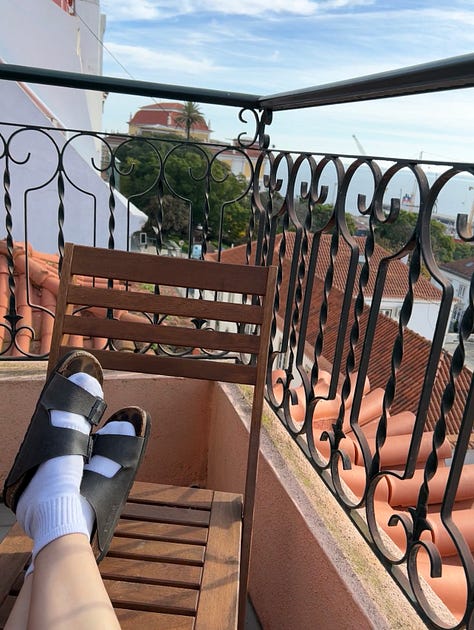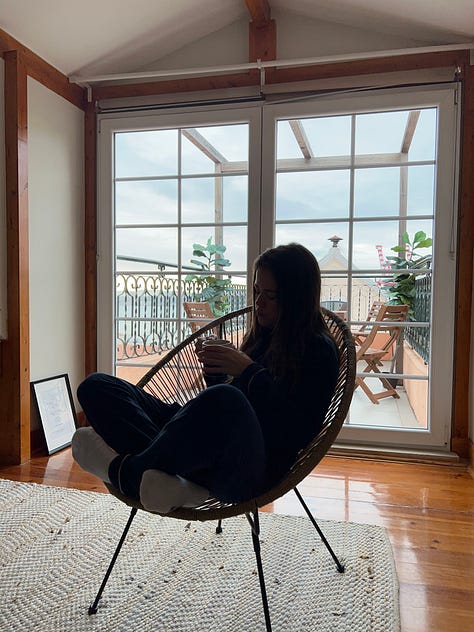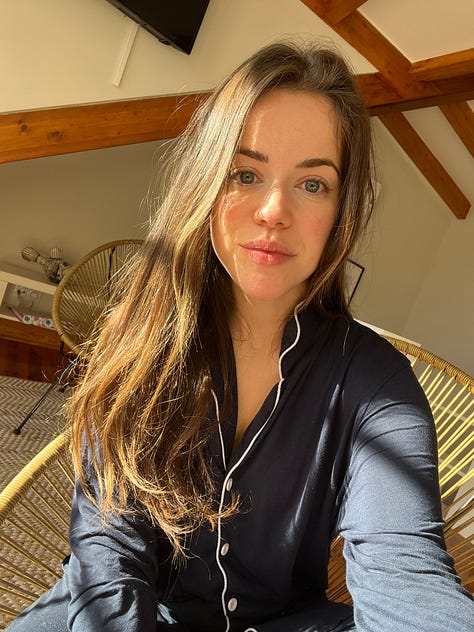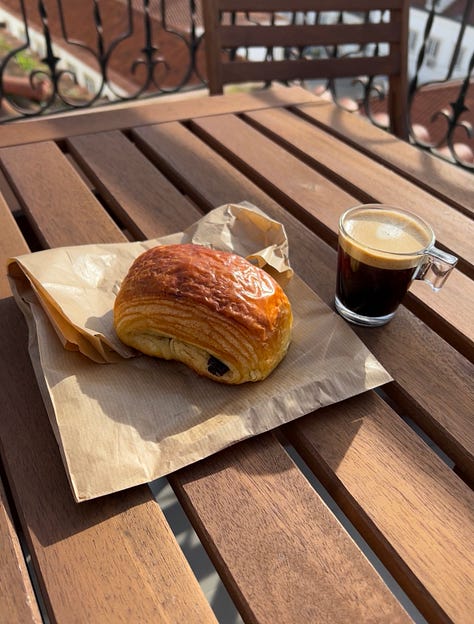Issue #5: The world's least zen morning meditation routine
Why meditating isn't *actually* for everyone; a glossary of mindfulness practices (& alternatives); plus, some views from my Lisbon rooftop terrace.
Meditation has become a billion dollar industry. Not bad for a practice that, a decade ago, was the preserve of barefoot monks in the caves of the Himalayas – I guess one nil in favour of capitalism. Look around any commuter train, and you’ll no doubt see a fellow passenger closed-eyed, solemn-faced and AirPod-ed, tuned into radio Headspace (65 million downloads) or CALM or Meditopia, happily oblivious while the intercom announces yet another delay.
Somewhere down the line, it’s a ‘Should’ that got to me. And it stuck. For the past 18 months, I’ve meditated every morning, channelling the sort of person I once inwardly rolled my eyes at at parties. Anyone who’s shared a bedroom with me since summer 2021, from close friends to casual flings, has been subjected to Tamara Levitt’s Daily Calm meditation upon waking.
The reason for my consistency is not godly levels of discipline; it’s the opposite. Meditation is so often dull and/or uncomfortable that I’m unable to do it sporadically; it has to be a non-negotiable. I’ve heard others make the same justification for daily gym sessions, although sadly for me and my abdominals I’m not among them.
Has it worked? That depends on what you define as progress. I still ruminate on thoughts I’d rather not; still talk a bit too fast when excited; still jump out of my skin when a Lime scooter zooms past. I’m not sure if meditation was supposed to cure me of these shortcomings, but they don’t seem very zen Buddha to me.

That said, I am, without a doubt, calmer; even my brother said so. I’ve learnt to put distance between, say, an argument brewing that I don’t want to have – to retreat to a safe place within me and opt out, rather than rise to it. I’m more in touch with my breathing. My thoughts are no longer facts (which, although a meditation cliche, is just about the most important revelation you can come to through practice).
Back when I was in London, I wrote a micro ‘day in the life’ account of my morning meditation routine, which is really more of an anti-routine.
My meditation ‘routine’
I’m woken by a cacophony of alarms: ‘Woodpecker’ by iPhone. The circular-sounding egg-timer of Alexa. My FitBit’s vibration. Three’s a charm, I take no chances; not since the one time I overslept, in 2015, as a Vogue assistant on minimum wage – the faux- ‘opportunity of a lifetime’. I still get nightmares about walking in down that Conde Nast corridor – colloquially dubbed ‘The Catwalk’ – circa 11:20am. But now, the distance I’m focussed on is the 50 yards from my bedroom to my ‘everything else’ room, then the mental obstacle course between me and my morning meditation.
I think, I should meditate. Instead, trance-like, I squint at Instagram – the screen centimetres from my face – scrolling my feed for something that feeds my soul – but instead I see a baby scan from my friend’s cousin, whom I’ve met once, and it makes me feel weird without knowing why. I click the heart outline, then mute her Posts and Stories in one fell swoop (‘Instagram won’t let you know that you’ve muted them’). I question what the fuck I’m doing. Why I’ve started my day like this, my head turned by a life that isn’t mine – that I’m not ready for – another of my precious mornings on this planet dedicated to Sarah’s cousin’s three-month-old foetus.
I put in my contact lenses, pat on a few drops of the £46 vitamin C serum that my friend with the glow-y skin uses, pull on a Uniqlo fleece I feel more love for than most of my exes, then a single, pink slipper-sock (and, after two minutes of rummaging, its estranged counterpart).
Time to meditate. Which means back to my phone, to the CALM app. But something makes me open Gmail, check on the status of that chronically-unpaid invoice – and there is a response, and it vexes me, so I bash out a response, Smart Compose finishing my sentences, and send it off with a satisfying whoosh.
And I’m about to meditate but outside there’s a leaf blower or drilling, always one of the two, so I grab my noise-cancelling AirPods, but I’ve forgotten to charge them, which bothers me. Instead I scroll my Twitter feed – wonder what the fuck I’m doing – then hide my phone under a glossy magazine I’ve subscribed to for years but never quite get to reading.
In a burst of inspiration, I tell Alexa to play my meditation track. She doesn’t understand: ‘Here’s something I found on the internet!’. I tell her to fuck off. She says ‘Okay’. I reach into my fleece pocket for my phone. It’s not there. Two minutes later, I discover it under the glossy magazine. I glance at a cover line about the benefits of mindfulness, which looks interesting. I light a candle – a fancy Diptyque one I received as a 30th birthday gift, which smells of lemon verbena leaves – and I do so with a match because it makes the ritual seem more poetic.
I open up CALM. Can I bear yet another session with Tamara Levitt – we recently celebrated our one year anniversary – or should I defect to Andy Puddicombe at Headspace or one of the fancy Insta-monks who divide their time between Silicon Valley and a monastery, all with an on-hand photographer well-versed in their best angles? I stand by my Tamara. Because, if it ain’t broke…
Two minutes later, I’m finally meditating. I’m not hurrying anywhere; I’m giving myself this time. Regardless of the still-unpaid invoice and the drilling and Sarah’s cousin's baby news and the fact I never actually put my AirPods on charge, this is my mental refuge from all the day’s bitty concerns. Silently, gently, through doing this I remind myself I matter.
I disassociate from my thoughts, chanting inwardly, Thinking, thinking, thinking. It’s Tamara’s technique to stop you actively engaging with the thoughts themselves – like you’re beating them off with a stick – to stop them carrying you off to someplace you don’t want to go. It begins to work, and I stop thinking at all. Because, meditation. No grasping for anything, no running through my to do list. Thinking, thinking. Breathe in, breathe out. For that moment, I’m just existing. Complete.
The Coulds
Glossary 🔍
Some common meditation terms, with links (concise articles and/or videos) to help you explore more.
🤯 Transcendental Meditation: A mantra-based meditation that started in the ‘60s but has recently enjoyed more mainstream popularity (it’s in the top 10 most Googled topics associated with meditation in the past year). It’s endorsed by Ellen DeGeneres and several of my previous podcast guests, including Holly Bourne & Emma Forrest.
💬 Mantra: Literally, something you repeat throughout chanting or meditation.
💭 Thinking versus feeling: A key meditation principle involves separating thoughts (e.g. ‘That person doesn’t like me’) with the interconnected feeling or emotion that arises as a result (e.g. rejection, sadness).
📝 Noting: Also referred to as ‘labelling’, this is a key meditation technique which involves becoming aware of certain thoughts or feelings without directly responding to them i.e. taking action.
👣 Grounding: You know when you’re in such a state, in states of heightened anxiety or overthinking, that you don’t feel ‘in your body’ anymore? This refers to meditation’s ability to help you ‘come back down to earth’, and regain a place of calm and control. Not to be confused with the mindful practice of ‘earthing’, which involves a more literal walking barefoot on the ground, as seen in The Earthing Movie documentary (although my inner hippy is intrigued).
🧠 Mindfulness: An umbrella term for being fully aware and engaged while doing something. This can span from traditional meditation to, say, chopping up vegetables.
Podcast episodes 🎙
Tara Brach on Happy Place: No one podcast episode can teach you how to meditate, in this episode the psychotherapist & meditation teacher (and yes, that’s a cool mix of disciplines) puts forward a compelling advertisement for the qualities meditation can bring to your life, including self-compassion and gratitude.
Michael James Wong: Mindfulness & The Value of Inaction Skills on Alonement: In a world where we’re taught from school how to deal with action – e.g. time-planning, productivity – many of us lack the skillset to do the opposite and be still (with an obvious detriment to our capacity to meditate). Listen from 14:39 to hear more.
‘Mindful’ meditation alternatives 🙃
Binaural audio: Popular among Gen Z-ers, binaural sounds are a type of audio therapy which uses two microphones to create a sort of ‘surround sound’ effect (you need to listen with headphones to experience properly). It’s associated with lowering anxiety and improving concentration. There’s not a wealth of scientific evidence (beyond what I just linked) but it’s tried and tested by me; just closing your eyes and listening for five minutes can be a grounding boon in the middle of a hectic day.
Breathwork: This involves manipulating your breathing patterns to improve your physical and emotional wellbeing. Sounds simple, but actually quite challenging (in a good way). This Mind Body Green article gives a good overview of some techniques, while The Breath Space offers a 21-day virtual course to get you started.
Articles/links 🗞🔗
Meditation for Beginners from Headspace (plus, free trial offer)
20 must-know meditation tips and techniques for beginners from Insider
Zen sickness: is meditation making you ill? by Lauren Clark for The Telegraph: Popular wisdom would have you believe meditation is always a ‘one size fits all’ positive solution – but a study by Brown University in 2017 found otherwise, observing for some it could lead to post-meditative anxiety or depression.
Let’s talk more about the ‘downside’ of meditation…
As you might have realised by now, I like to play devil’s advocate, even with – especially with – the ‘shoulds’ I consider useful, like meditation in this case. So what are the potential pitfalls? This is what you said…
‘I find [the meditation trend] has caused people to talk past one another in conversations about spirituality, because so much of the language around it (yoga, meditate, etc.) means different things to different people.’ - Michael, 26
It can be used as a tool to distract from wider, structural issues that can cause depression, anxiety etc when it's positioned as a solution entirely in the individual's grasp. Both can be true, but I've known people who are mentally unwell because of a situation they cannot escape and "Why don't you try meditation?" is an irrelevant suggestion.’ - Katie, 30
‘A lot of people confusing meditation with ruminating. If you sit still but aren’t given the tools, it can make your mental health worse because you spend the time spiralling.’ - Michelle, 29
I think, as Katie says, all these things can be true – and, at the same time, a regular, 10-minute meditation practice, done correctly, could benefit the vast majority.
Personally, the only ‘downside’ for me on a personal level is that my meditation doesn’t feel as effective as it used to – but apparently this is common if you’ve been practising for a while.

‘This is a thing! It shows it is working, but you've normalised a level of calm that you notice when you stop doing it,’ responded Chloe Brotheridge, a hypnotherapist, coach & meditation fan. ‘If you find that you feel worse when you get out of the habit of meditating - that's a sign that it's working!’ (and she hit the nail on the head – I feel awful on the rare days I don’t meditate first thing).
Here’s the advice Chloe shared for me & anyone else in this position:
Tips if your usual meditation has ‘stopped working’ 🧘♂️
Focus on doing it regularly. Even if it’s just a few minutes a day, it’s the regular meditation that works best, rather than just doing it when you feel stressed.
Try out different types until you find one that works for you (e.g. Transcendental Meditation, or even hypnotherapy recordings which can be good as an access point to meditation).
Do some yoga beforehand. ‘Yogis in India do this in order to train their bodies to be able to sit longer for meditation - and I've found that even 10 minutes of yoga before meditation helps to get stress out of the body and calm the mind down so that your meditation is better.’






Lisbon pt. ii: Alonement abroad
I’m now in my sixth (seventh?) week in Lisbon. It’s a slower, smaller life punctuated by thrice-weekly yoga and the same familiar faces. Right now it’s feeding me well in every way, including literally: earlier this week, I had dinner at a concept restaurant called Oyster & Margarita with Abigail (of the brilliant
, which I've mentioned before in this newsletter). No clues for guessing what we ate. This time last week, I moved into a studio apartment-for-one located up six cramped flights of stairs (shout out to my now ex-flatmate – sob – Tom for lugging my gigantic yellow suitcase), with the prize of a sunny to-die-for terrace at the top. The flat has its quirks (including a lack of washing machine, which means I now have a ‘married couple’ esque joint laundry situation going on with my neighbour who kindly lets me use his), but equally it is an alonement dream come true, with a wicker chair where I've been meditating each morning, a little kitchen and dining area to host friends, and the aforementioned Terrace of Dreams. On Sunday, I sat there eating there eating a flaky pain au chocolat from the bakery down the road, with a smooth-roast espresso and the Times Style supplement, thinking: ‘It doesn't get much better than this.'Next week’s theme 🥁
I realise this and last week’s themes have been accidental humble brags, but, you know what, bear with me, and I promise to step out my comfort zone with a theme that I find much more challenging to write about next week. And that theme, ladies and gentlemen, is:
‘I should have more casual sex.’
It’s a conversation I’ve had often with my friends – the tension of growing up as a millennial generation watching Sex And The City while simultaneously trying to assess one’s own comfort levels around sexuality and desire. I’m so interested to hear what you all have to say on this, and to explore this topic for next week’s newsletter.
In the meantime, stay happy, stay curious – and stay in touch, I’d love love love to hear from you in the comments section. Let’s continue the conversation!
Francesca











Thank you for sharing invaluable resources <3 You don't have to be perfect in your practice as long as you're consistent in making time for your Me Time. Personally, I call my mat My Sanctuary :)
I loved this nuanced overview of meditation, and was the kick up the backside I needed to get back to practising it. I’m also a huge fan of the soundscapes in Calm for some comforting background noise every now and then. Great for when you know silence might start to get your thoughts talking and spiralling, but you can’t meditate right that moment.